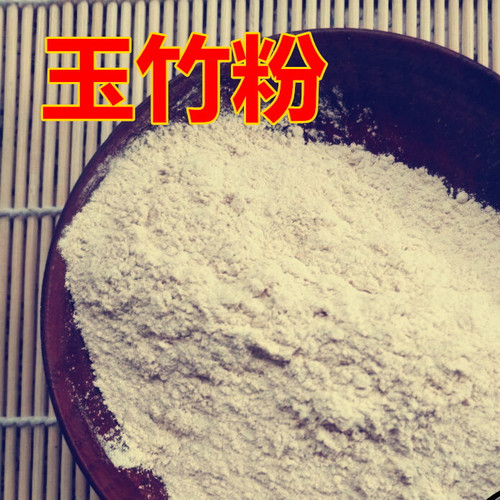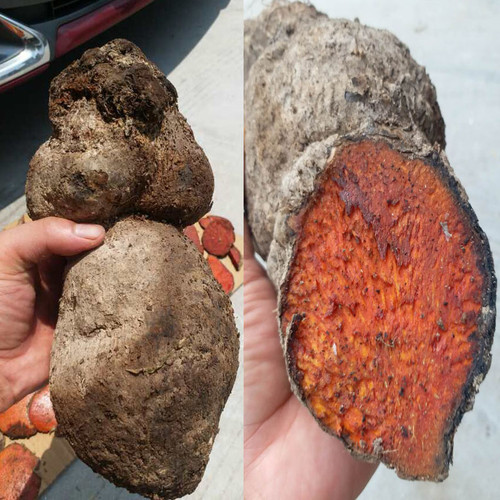Product Overview
Parts used: Dried rhizome
TCM category: Tonic herbs for Yin Deficiency
TCM nature: Cold
TCM taste(s): Sweet
Meridian affinity: Stomach Lung
Scientific name: Polygonatum odoratum
Other names: Scented Solomon's seal, Jade bamboo
Use of angular solomon's seal roots (Yu Zhu) in TCM
Please note that you should never self-prescribe TCM ingredients. A TCM ingredient is almost never eaten on its own but as part of a formula containing several ingredients that act together. Please consult a professional TCM practitionner, they will be best able to guide you.
Preparation: After collection, remove fibrous elements, wash, dry slightly and rub until it is translucent. Wash again, soak in water, cut in thick pieces and dry.
Dosage: 6 to 12g.
Main actions according to TCM*: Nourishes the Yin of the Lung and Stomach. Generates Fluids and extinguishes Wind. Stop thirsty.
Primary conditions or symptoms for which angular solomon's seal roots may be prescribed by TCM doctors*: Sore throat Dry cough Rheumatism Gout Water retention Diabetes
Contraindications*: This herb should not be used by those with Cold Damp Phlegm in the Stomach.
Common TCM formulas in which angular solomon's seal roots are used*:
For Kidney Essence Deficiency manifested by an aching back, dizziness and Heat on the soles of the feet combine angular solomon's seal roots with glossy privet fruits (Nu Zhen Zi) and goji berries (Gou Qi Zi).
For Wind-heat with yin deficiency combine angular solomon's seal roots with wild mint (Bo He) and fermented soybeans (Dan Dou Chi).
For Qi and Yin deficiency with stifling sensation in the chest combine angular solomon's seal roots with codonopsis roots (Dang Shen).
Key TCM concepts behind angular solomon's seal roots (Yu Zhu)'s properties
In Traditional Chinese Medicine (TCM), angular solomon's seal roots are plants that belong to the 'Tonic herbs for Yin Deficiency' category. Tonic herbs are used for patterns of Deficiency, when one lacks one of the 'Four Treasures' (Qi, Blood, Yin and Yang). Yin tonics have a heavy, moist nature. They either nourish the Kidneys and Liver or moisten the Lungs and Stomach. Extreme Yin Deficiency often translates into a 'burn-out', unfortunately more and more common among people today. It is worth mentioning that another great remedy against Yin Deficiency is a lot of rest and sleep; no herb will ever be able to replace this!
Furthermore angular solomon's seal roots are plants that are Cold in nature. This means that angular solomon's seal roots typically help people who have too much "heat" in their body. Balance between Yin and Yang is a key health concept in TCM. Those who have too much heat in their body are said to either have a Yang excess (because Yang is Hot in nature) or a Yin deficiency (Yin is Cold in Nature). Depending on your condition angular solomon's seal roots can help restore a harmonious balance between Yin and Yang.
Angular solomon's seal roots also taste Sweet. The so-called "five elements" theory in Chinese Medicine states that the taste of TCM ingredients is a key determinant of their action in the body. Sweet ingredients like angular solomon's seal roots tend to slow down acute reactions and detoxify the body. They also have a tonic effect because they replenish Qi and Blood.
The tastes of ingredients in TCM also determine what organs and meridians they target. As such angular solomon's seal roots are thought to target the Stomach and the Lung. In TCM the Stomach is responsible for receiving and ripening ingested food and fluids. It is also tasked with descending the digested elements downwards to the Small Intestine. In addition to performing respiration, the Lungs are thought to be a key part of the production chain for Qi and the body fluids that nourish the body.
Use of angular solomon's seal roots (Yu Zhu) as food
Angular solomon's seal roots are also eaten as food.










